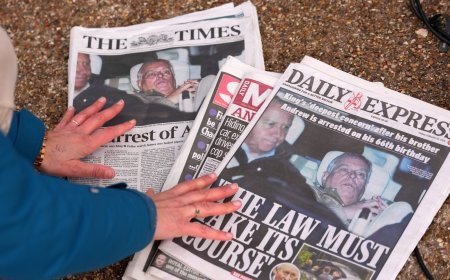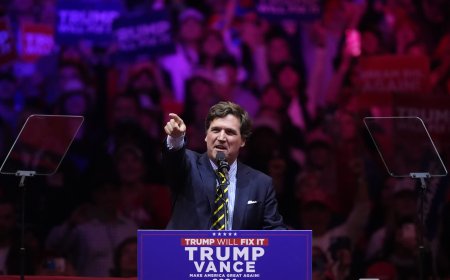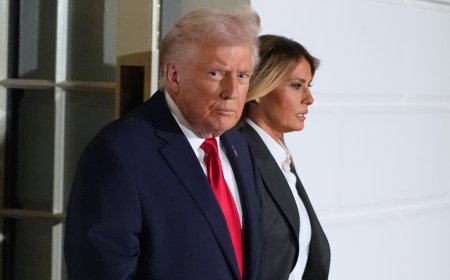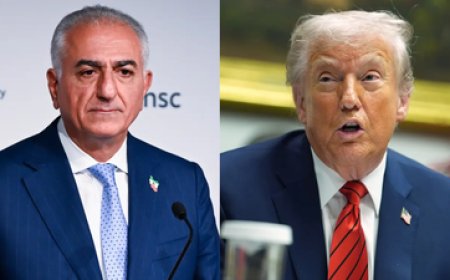Poland’s Trump Conundrum—and Vice Versa
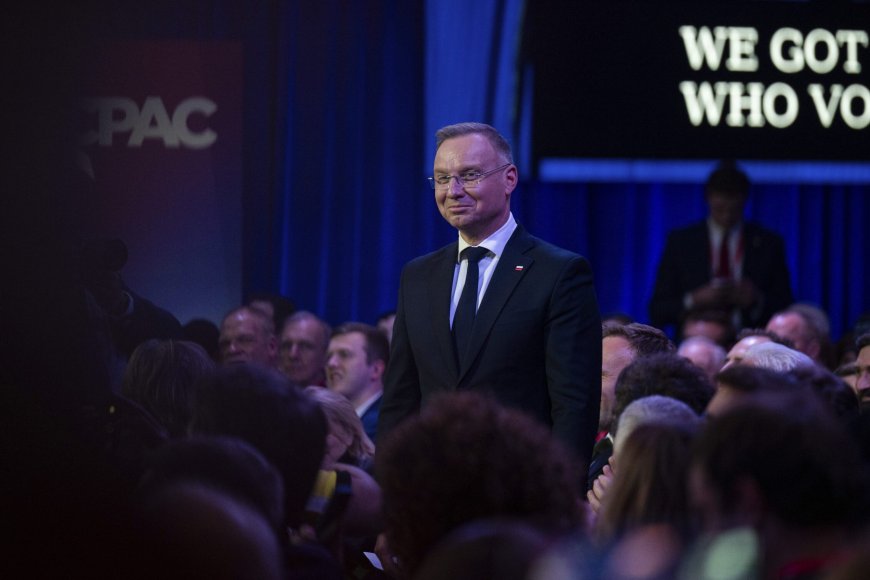

Every country, from Canada to Vietnam, is facing the same high-stakes conundrum: Is it wiser to try to placate Donald Trump or to push back against his bullying and outlandish demands?
Arguably, no nation is in a more difficult position than Poland. Historically one of America’s closest European allies, it’s also the country with the most to lose if a revanchist Russia, emboldened by a skewed peace in Ukraine, sets its sights on regaining its traditional sphere of influence not just within the former Soviet Union but also beyond it.
Imagine a spectrum with China on one end and Italy on the other. Beijing has defied Trump’s tariffs and hit back hard with retaliatory levies. Italian Prime Minister Georgia Meloni, the only European leader to attend Trump’s second inauguration, never misses a chance to flatter the 47th president and is angling for a trade deal.
In between, Japan and South Korea say little in public while pursuing bilateral agreements with Washington. Britain and France make nice in the Oval Office but still strive, with charm and diplomacy, to persuade Trump to block Vladimir Putin’s bid to dominate Ukraine. Incoming German Chancellor Friedrich Merz has taken a tougher stance, vowing European “independence from the USA.” So has Canada, where Prime Minister Mark Carney, fresh off a stunning electoral triumph for his once-seemingly-doomed Liberal Party, has accused the American president of “trying to break us so he can own us.”
Both leaders of Poland’s two-headed “cohabitation” government—national conservative President Andrzej Duda and centrist Prime Minister Donald Tusk—were once touted as “Trump whisperers” who could wrangle the U.S. president on behalf of Europe. Neither has managed to capture that mantle—if indeed there is such a thing. Several Polish officials, all of whom I spoke to this month, were wary of the term and requested anonymity as their nation heads into a presidential election.
“Look,” one insider cautioned, “we have to be realistic. No European leader says what they really think about Trump—and no one has a perfect strategy for managing him. We all just try to find ways to maintain ties and do what we can to persuade him of our point of view.”
Warsaw has a long history with both Moscow and Washington. Strategically located in the center of Europe, with 37 million people and few geographical barriers to protect it, Poland has been battling an aggressive, expansionist Russia for nearly three centuries. The Russian Empire controlled almost two-thirds of Polish territory from 1795 through World War I. Then, after World War II came four decades of brutal Soviet domination.
When the Cold War ended, Warsaw raced to join the West. Dramatic free-market reforms swept away the last vestiges of communism. Early membership in the European Union unleashed a flood of Western investment. In the early 1990s, Warsaw began to talk about joining NATO and, ever fearful of its eastern neighbor, launched a military buildup that would make it one of Washington’s most trusted allies.
The past decade added a layer of ideological kinship. Poland’s national-conservative Law and Justice Party (PiS) swept into office in 2015 just as Trump began his ascent to the White House. Trump and Duda struck up a personal relationship. PiS and MAGA bonded over populist opposition to abortion and wokeism. In 2024, PiS deputies disrupted the Polish parliament, chanting Trump’s name to celebrate his reelection—a return they hoped would boost their chances in the upcoming Polish elections.
But underneath these ideological trappings, the heart of the Polish-American relationship is military, and it has remained intact even as PiS’ political influence wanes. Poll after poll finds fear and mistrust of Russia spread across the Polish political spectrum. According to a 2024 survey by the Pew Research Center, 97 percent of Poles have a somewhat or very unfavorable view of Russia, the largest share in any of the 35 countries surveyed. Prime Minister Tusk, a centrist, sets the government’s course and is as committed to a strong military as outgoing President Duda, a conservative. If anything, the two parties joust to prove who is more staunchly anti-Russian.
Already on the upswing in the late 1990s, Poland’s military buildup accelerated sharply in the past decade. Its army more than doubled to become Europe’s largest. Its defense budget ballooned to 4.7 percent of GDP—the largest share in NATO. (In 2024, the U.S. spent 3.4 percent of GDP on security.) The 2026 goal is 5 percent, making Poland the only country to hit Trump’s demand for NATO.
From Washington’s point of view, Poland was the perfect ally, carrying its share of the burden but still subservient to America. Over half the arms and ammunition it purchased in 2024 were made in the United States, and much of its new weaponry is turned over to NATO for Europe’s collective defense, which Washington coordinates. Warsaw also covers the cost of facilities and logistics for the 10,000 U.S. soldiers stationed on Polish soil and has pleaded with the Pentagon to send more troops, offering $2 billion for a new base, “Fort Trump.”
In theory, the second Trump administration should be delighted with Warsaw. But things got off on the wrong foot after the inauguration. Duda traveled to Washington in February, hoping for an Oval Office meeting, only to be left pacing for 90 minutes in a back room at the Conservative Political Action Conference (CPAC) summit, waiting for what turned out to be a 10-minute chat. Then came the face-off between Elon Musk and Polish foreign minister Radosław Sikorski—a battle of tweets about Ukraine’s use of Starlink that ended with the Trump-aligned mogul dismissing the diplomat, “Be quiet, small man.”
Poles watched with horror this spring when the Trump administration punished Volodymyr Zelensky by turning off software updates for U.S. missiles in Ukraine, rendering them all but useless. Then, in early April, the Pentagon announced it was withdrawing U.S. personnel from Jasionka, the military transit hub in eastern Poland that serves as a gateway for Western arms shipments to Ukraine.
Polish officials play down these adverse developments. After all, they say, Trump saluted Duda from the podium at CPAC, calling him “a fantastic man and a great friend of mine.” And the Jasionka transition was planned months ago—seen by many, in fact, as a way of Trump-proofing Ukrainian arms shipments by putting NATO in charge.
Still, there can be no mistaking Trump’s desire for a reset with Moscow—a prospect that strikes terror in Polish hearts.
What Warsaw fears most is a withdrawal of American troops from Poland. “That would be a major blow,” one high-level security official explained, “a clear signal to Moscow—and one that could provoke Putin to further aggression, perhaps here in Poland or in the Baltic states.”
It took Warsaw nearly 20 years to persuade NATO to station forces in Poland. Even then, the brass at NATO’s headquarters in Brussels insisted that their presence be rotational, not permanent, for fear of provoking Moscow. Putin has repeatedly demanded that NATO troops be withdrawn from Polish soil—they are one of the so-called “root causes“ that Moscow says made it necessary to invade Ukraine in 2022. The Trump administration has made no secret of its ongoing review of the U.S. “force posture“ in Europe. “You can’t make an assumption that America’s presence will last forever,” Secretary of Defense Pete Hegseth warned Europeans when he visited Warsaw in February.
Polish insiders say the Americans they speak to have not indicated cuts are coming. “On the contrary,” one official told me. “Washington has positioned Poland as a role model for the rest of Europe, urging other countries to spend as much on defense as we do. Withdrawing troops would fundamentally undercut that message.” They hope that rational voices will prevail and Trump will wise up to the way Putin is manipulating him.
“Obviously, we have no guarantees,” another insider admitted. “But our calculations are more than wishful thinking. We’re counting on the U.S. recognizing its own self-interest.”
But even if Warsaw and others in Europe can avoid an open rift with Washington, the ground beneath their feet is already shifting.
In Poland, the repercussions start with politics. Trump’s overtures to Moscow have left the PiS party in an existential bind, clinging to its MAGA friends even at the cost of diluting its historic identity—animosity for Russia. Meanwhile, centrist coalition presidential candidate, Warsaw mayor Rafał Trzaskowski, believes Trump’s tilt toward Putin is triggering a landmark shift, driving traditionally Euroskeptic Poles into a closer embrace of Brussels.
Other coalition officials, including parliamentarian Paweł Kowal, worry that Trump’s readiness to cede Ukrainian territory undermines respect for borders, all but inviting Russia to invade Poland.
What’s also eroding—at untold cost—is the trust at the heart of Poland’s model alliance with America. What Europeans—Poles or anyone else—will now look first to the U.S. when purchasing weapons? How long will European intelligence services be willing to share sensitive information with Washington? And how long will any allies anywhere trust Washington’s judgment of their strategic interests?
Trump is pressing America’s European allies to be self-sufficient. But as Poland shows, he may regret that. Every step toward European independence means less predictable partners and less influence for Washington.
The post Poland’s Trump Conundrum—and Vice Versa appeared first on Washington Monthly.










